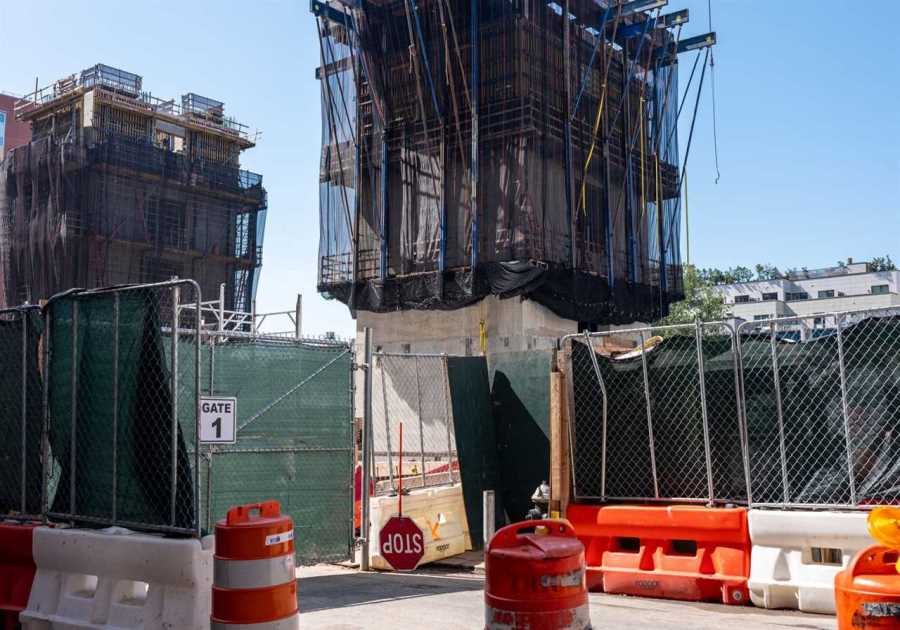FREDERIC J. BROWN/AFP via Getty Images
- US corporations are working to reduce their dependence on China for manufacturing and trade.
- While this could create American jobs, it could make a wide range of products more expensive.
- These price pressures could make cooling inflation more difficult for the Federal Reserve.
US corporations are making more stuff in America. But fewer made-in-China product labels will likely also mean higher prices for Americans at the checkout line.
That's according to a new paper from JPMorgan, which explored how US efforts to reduce supply chain dependency on China could impact consumer prices in the years ahead.
While these efforts should create US jobs, there's a potential downside for Americans. Given it's generally more expensive to manufacture goods in the US than China, shoppers could have to pay more for made-in-America items like clothes, toys, and furniture.
"No plausible path for US-China trade should put downward pressure on US inflation comparable to what was observed during the 2000s," the authors wrote.
However, JPMorgan researchers found that the inflationary impact of doing less business with China will likely be relatively small in the near term — up to 10 to 20 basis points each year between now and 2032. That's the equivalent of a 3.0% annual inflation figure being 3.1% or 3.2%.
Efforts to "friend shore" — or shift some manufacturing and trade to US allies like Mexico — could help offset some price pressures.
The made-in-America movement could boost inflation
Since the turn of the century, cheaper overseas manufacturing costs in countries like China have driven down US prices for goods like smartphones, TVs, and computers. Even for companies that continued to make goods in the US, buying supplies from overseas helped keep prices down. Between 2000 and 2010, the surge in Chinese imports reduced US inflation by roughly 40 basis points per year, JPMorgan's researchers said, relative to a more modest import growth scenario.
But times have changed and recent global factors have pushed US corporations to bring their supply chains closer to home. These events include pandemic-era supply chain nightmares, Russia's invasion of Ukraine, and Chinese national security and human rights concerns. The ongoing war between Israel and Hamas could expedite these efforts.
Last year, 364,000 jobs were "reshored" in the US, according to a report by the Reshoring Initiative, a non-profit that tracks manufacturing data, and whose mission is to bring high-paying jobs back to the US. This number, which was up 53% from 2021's record-high figure, included jobs that had been previously done in other countries and those created in the US by foreign-owned corporations.
More jobs could be on the way. Construction spending by US manufacturers more than doubled between June 2022 and April 2023, according to Census Bureau data.
US shoppers aren't the only ones who should be closely monitoring the impacts of reshoring, JPMorgan's paper reported. That's because higher prices could make it more difficult for the Federal Reserve to cool inflation.
"If the Fed lacks the ability or willingness to anticipate and neutralize the effect of this supply shock, it could lead to higher inflation," the report said.
Even if reshoring has a modest impact on inflation over the next year, every little bit matters in the Fed's fight to hit its long-term 2% inflation target.
"Inflation is still too high, and a few months of good data are only the beginning of what it will take to build confidence that inflation is moving down sustainably toward our goal," Federal Reserve President Jerome Powell said to the Economic Club of New York last week.
If the Fed anticipates these price pressures and keeps interest rates higher for longer, this could help keep inflation in check. But even this could have a downside for Americans. Higher interest rates are making it difficult for many people to buy a home and meet their car payments.
"Monetary policy could be more restrictive than otherwise for the duration of the shock," the report said.
Read More
By: [email protected] (Jacob Zinkula)
Title: Why 'Made in America' will make everything more expensive
Sourced From: www.businessinsider.com/us-china-relations-reshoring-manufacturing-jobs-made-in-america-2023-10
Published Date: Wed, 25 Oct 2023 10:03:01 +0000
.png)





